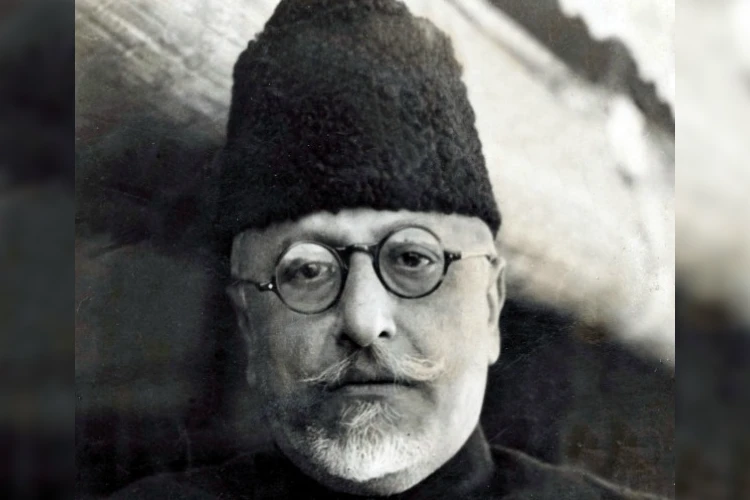
Saquib Saleem/New Delhi
Muslims across the world consider giving utmost importance to the Friday Prayers. It is preceded with a sermon, which is actually a part of prayer, delivered by the Imam (leader of the prayer).
The sermon, in India, is often read out from a book of sermons written in Arabic. No wonder, almost nobody out of those offering the prayers understand these sermons delivered in an alien language.
Maulana Abul Kalam Azad understood that fanaticism, extremism, ignorance and social ills prevalent among Indian Muslims were because they did not understand the religion taught to them in Arabic, a language they could not decipher. In 1916, during the First World War, he was interned at Ranchi for his role in Silk Letter Conspiracy and attempts at uniting Muslims and Hindus in an armed struggle against the British Empire.
In his newspaper Al-Hilal, he exhorted Muslims, “No doubt there will be a chapter which will say that India did forge ahead towards the goal of freedom and progress and the Hindus did pay with their lives for it. But when the bugle was blown on the battlefield the Muslims went and hid themselves in the caves. When the Hindus called them, the Muslims sealed their lips..."
"When the country was smarting under unjust laws, it was the Hindus who carried on a crusade and the brave Muslims not only refrained from jumping into fray but shrieked like demented persons that those who had joined the struggle were rebels……… the world will remember that whatever happened rebounded to the credit of any community but the Muslim", he added.
No wonder such an open call for Muslims to join Hindus in an armed struggle was ‘seditious’ for the British Empire and Maulana Azad was sent to Ranchi. In 1916, Ranchi was not a big city and the ‘authorities’ believed that his ‘anti-British’ activities would stop. With more than 60,000 signatures an application of his well wishers got him permission to offer Friday prayers at a local mosque.
The first time Maulana went to the mosque, people asked him to lead the prayer and when he started the sermon in Urdu everyone was amazed. They could not imagine a Friday sermon in a language they understood. Even today, most of the Indian Muslims will not believe this. The content was more than religious. Maulana Azad talked about social, political and economic matters during the sermon. He later recalled, “I was forced to deliver the sermon. These persons had never heard a real Friday sermon.
They thought a sermon meant only recitation of some Arabic prayers…… The world has seen what manner of work I could do while I was free and unfettered. Let it see what I can accomplish during the detention and imprisonment, for the real challenge and the real test is here and now.” Maulana took up the challenge. He used Friday Prayers as a platform to preach social awakening and nationalism among the local population. Soon, Hindu population of the city enquired if they could also listen to their leader and his message.
General Muslim populace was confused for they believed that non-Muslims should not enter a mosque. Maulana Azad clarified that it was not the case and Hindus also started attending these Friday sermons for which arrangement was made. Maulana Azad showed that the real purpose of mosques and prayers was in bringing social awakening and creating brotherhood among people of all faiths.
In January, 1920, Maulana Azad’s internment was withdrawn. But, by now he had shown to the world the real meaning of Friday sermons. This is why, when Muslim League led by Mohammad Ali Jinnah pressed for its demand of Pakistan after 1937 the first mass movement was to take away the position of Imam (prayer leader) from Maulana Abul Kalam Azad.
In fact, in 1938, Muslim League leaders organised a separate Eid Prayer in order to delegitimise the position of Maulana Abul Kalam Azad as Imam. Maulana Azad was a visionary and believed in unity. He himself said that if people did not unite behind him he would not lead the prayers. In his absence Maulana Sufi Mohammad Shah of Azhar University, Cairo led the prayers of anti Muslim League Muslims while another prayer of Muslim League supporters was led by a Maulana from Kanpur. The importance of this event where Maulana Azad was stopped from leading the prayers holds an important place in the historiography of Pakistan.
Founders of Pakistan believed that by stopping Maulana from leading the prayers they achieved a significant victory. Raghib Ahsan, a close associate of Jinnah, wrote to Jinnah, “Thousands and millions of congratulations on your master-stroke against the Muslim “show-boy” of the Congress. By deposing him from the Imamate of the Calcutta Maidan the Calcutta Muslims demonstrated the fact long ago that Mr. Abul Kalam Azad is an outcaste in Muslim society…… This kick in reality represents the abysmal degradation and humiliation of this Ghaddar. Azad must be experiencing the agony of his life.”
ALSO READ: Nawab Faizunnesa of Bengal who rejected honour from the Queen
Sadly, the message of Maulana Azad has lost its relevance somewhere in divisive politics of Muslim League and mechanisations of a few Ulema who wanted to keep people ignorant of the real message of Islam. It is important to revisit the ideas of Azad and start using our mosques and prayers for constructive social, economical and political work.
